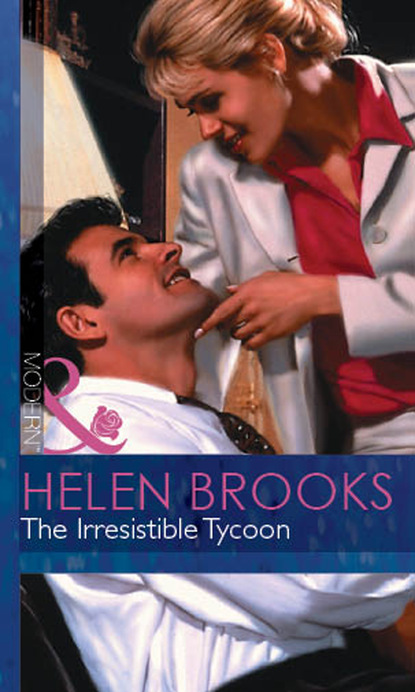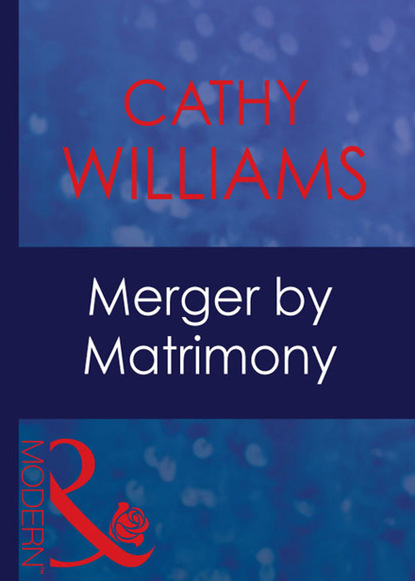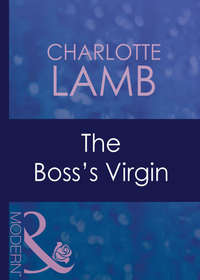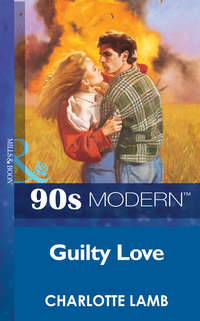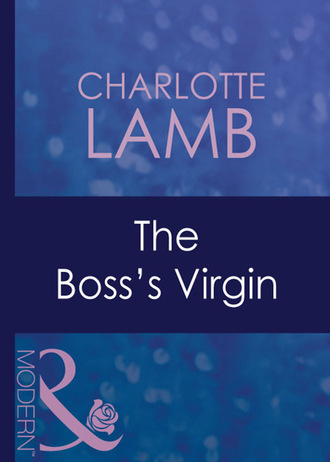
Полная версия
The Boss's Virgin

As soon as she was in his arms she felt herself yielding to the powerful erotic sensations he awoke in her.
Slowly Randal pulled his head back and looked down at her, and Pippa opened her eyes to stare back at him.
“You kiss me like that, and yet you keep pretending you don’t want me?” he whispered. “What’s going on inside that head of yours? We’re both free now, there’s nothing to keep us apart—so why are you still fighting it?”
Note from the Editor:
Charlotte Lamb passed away on 8 October 2000, at her home on the Isle of Man, U.K., surrounded by her family.
She started writing for Harlequin Presents® in the early 1970s, and published 116 novels for the line. More than 100 million copies of her stories have sold worldwide. The Boss’s Virgin was completed just before her death.
Charlotte Lamb will be missed by millions of readers around the globe.
The Boss’s Virgin
Charlotte Lamb

MILLS & BOON
Before you start reading, why not sign up?
Thank you for downloading this Mills & Boon book. If you want to hear about exclusive discounts, special offers and competitions, sign up to our email newsletter today!
SIGN ME UP!
Or simply visit
signup.millsandboon.co.uk
Mills & Boon emails are completely free to receive and you can unsubscribe at any time via the link in any email we send you.
CONTENTS
CHAPTER ONE
CHAPTER TWO
CHAPTER THREE
CHAPTER FOUR
CHAPTER FIVE
CHAPTER SIX
CHAPTER SEVEN
CHAPTER EIGHT
CHAPTER NINE
CHAPTER TEN
CHAPTER ONE
THE party was going to go on for hours, but Pippa was tired; it was almost midnight and she normally went to bed before eleven. When she was younger she’d been able to stay up all night at parties, but her body didn’t have the late-night habit any more since she’d had to be at work by eight every weekday morning. She had been forced to realise that burning the candle at both ends was crazy.
She kept yawning, which wasn’t surprising since the flat was packed with people and oxygen was scarce. She was beginning to feel quite dizzy as she shuffled around, dancing with Tom under flashing strobe lighting.
‘Can we go soon? Would you mind?’ she whispered in Tom’s ear, and he blinked down at her, looking half asleep himself before he smiled that slow, sweet smile of his.
‘I don’t mind at all. I’m dead on my feet. Let’s go and find Leonie and make our excuses.’
They found her in the kitchen making more bites on sticks: bacon-wrapped dates, bits of cheese sandwiched with pineapple, like the other finger food she had been circulating earlier. She hadn’t had any help organising her party; she must have been working very hard all day.
‘Sorry, Leonie, we have to get moving,’ Pippa said apologetically, kissing her. They had worked together for some years now and Pippa was fond of her. ‘We have a long drive back. It was a lovely party; we had a great time. Thanks for inviting us.’
Leonie pushed back her long blonde hair then hugged Pippa. ‘Thanks for coming. People seem to be enjoying themselves, don’t they?’
‘They certainly do. Great food and great music. Where did you get that lighting from?’
‘Hired it—it didn’t give you migraine, did it? I know it triggers migraines in some people.’
‘No, it didn’t give me migraine.’ But she had hated it all the same; the constant, blinding flashes of bright light combined with the loud music had made her head ache.
‘Have some cheese,’ Leonie offered, and Pippa took a piece, bit it.
‘Delicious, thanks,’ she said. ‘Sorry to have to go. I hope you’ll be very happy, Leonie. You’ve got a great guy there; I’m sure you will be.’
Leonie glowed, eyes happy. ‘He is gorgeous, isn’t he? And so is Tom!’
He laughed and she kissed him. ‘I mean it! You are. I’m really looking forward to your wedding.’
‘So are we,’ Tom said, holding Pippa tighter. ‘We seem to have been planning it for years. I can’t believe it’s going to happen at last next week. You’ll be planning yours now. Believe me, it’s a mistake to hurry. There’s so much to work out.’
Tom was good at planning, drawing up lists, double-checking every little detail. He had masterminded their wedding; Pippa had simply attended to the details.
‘Well, must go,’ he said, and she followed him out of the flat into the faint chill of a spring night. She took his arm, snuggling close to him for warmth. The flat had been so crowded and overheated; the fresh air hit them with a blow that woke them up.
His car was parked down the road. All around them London glowed and buzzed although it was nearly midnight. On a Saturday most young people went out or had parties. The central city streets would be heaving with people drinking and laughing, spilling out of pubs and restaurants to stand in the road, talking, reluctant to go home yet.
Tom hadn’t drunk much—he never did; he was a very careful abstemious man—but he had to concentrate to keep his wits about him as they drove through the busy streets which led through the West End and the grey, crowded streets of the much poorer East End into the eastern suburbs. At last, though, they came to the road leading to rural Essex, and within twenty minutes were a short distance from Whitstall, where they both lived.
A small Essex town with a busy market once a week, it had once been a remote village, a cluster of small cottages around a pond, where cattle had stood up to their knees, drinking, a medieval church with a white-painted wooden spire, and a couple of traditional pubs. They drank at The Goat, whose new sign suggested devil worship, although the name actually related to the goats which had once been kept on the common. The King’s Head had a very old sign: a mournful Charles the First swung to and fro in the wind above the door.
During this century the village had grown into a town as the railway, and then the advent of the motor car, encouraged people from inner London to move out into the country. With new people had come more houses, circling and doubling the old village centre.
Tom had arrived first and bought a new house on a small modern estate which had been built. Pippa had come to his house-warming party and fallen in love with Whitstall, so she had bought herself a cottage there, too.
‘We’ll be home soon now,’ Tom murmured.
Pippa yawned beside him, her chestnut hair windblown around her oval face and her slanting green eyes drowsy. ‘Thank goodness! Mind you, I enjoyed the party. It’s great to see our colleagues letting their hair down now and then. They’re usually concentrating too hard to smile much.’
‘It was fun,’ he agreed. ‘Leonie and Andy seemed to be on top of the world—she’s very happy, isn’t she? Getting engaged suits her.’
‘Suits me, too,’ Pippa said, chuckling.
He laughed, reaching a hand across to touch one of hers, the hand which bore his ring, a circle of little diamonds around a larger emerald. ‘Glad to hear it. It certainly suits me. Being married will be even better.’
‘Yes,’ she said. At last she would be part of a family; she couldn’t wait.
The street lamps had ended. They were driving along narrow, dark country roads between hawthorn hedges beyond which lay fields full of black and white cows which had a ghostly look as they moved, flickering and dappled, over the grass they grazed on. Here and there one saw a frilly-leaved oak tree, or an elm vaguely outlined against the night sky.
Pippa sleepily thought about her wedding dress, which would soon be finished. The village dressmaker was hardly what you could call rapid—indeed she worked at a sloth’s pace, whenever she felt like it, Pippa had decided—but the dress was exquisite, a vision of silk and pearls and cloudy fullness. Pippa had a final fitting tomorrow morning. She couldn’t take time off work; her fittings had to happen at weekends. Of course, Tom had never glimpsed the dress; everyone insisted that that would mean bad luck.
She already had her veil, but she had yet to buy the coronet she would wear to hold her veil down. She had been looking for exactly what she wanted for weeks, without success. Then on Friday evening, as she’d walked to the tube station, she had seen a coronet of pearls and amazingly lifelike white roses in a wedding shop in Bond Street. Unluckily the shop had shut at six o’clock, so she hadn’t been able to buy it. She would go back on Monday, during her lunch hour.
It had taken months to plan everything. She had often wished she had a mother to help her, but, being an orphan without any relatives, she had had to manage alone. The wedding had eaten up half her savings as she had no family to pay the costs. Tom had generously insisted on paying half, making himself responsible for the reception, the white wedding cars and the flower arrangements in the church.
Her green eyes slid to his profile, half in shadow, half lit now and then by moonlight, showing her a straight nose, floppy fair hair, a still boyish face. He was a wonderful man: tender, caring, warm-hearted. She had known him for four years and the more she learnt about him the more she liked him.
And yet… She sighed. And yet, she was still uncertain, troubled. He had first proposed two years ago, but she had gently refused that time, and the next two times he had asked her to marry him. Marriage was an important step; it meant far more than living together, or sharing a bed. She hadn’t had a family or a home as a child. She had been brought up in foster care, never feeling she belonged to anyone, or anywhere, envying other children who had parents who loved them.
She had no idea who her parents had been, in fact. She had been left outside a hospital one rainy spring night. Nobody had ever come forward with information about her background. Enviously she had watched other children at school who had a family, a home, something she was never to know.
In consequence she took marriage and family very seriously. To her, marriage meant committing to spending the rest of your lives together, and she wasn’t sure she could face that with Tom.
Oh, she liked Tom a lot, found him very attractive, knew him well. He was her boss. They had worked together every day in the same London office for four years, and had always had a good working relationship. Pippa enjoyed his company; he was a good-looking man, and when he kissed her or touched her she wasn’t repulsed. If they had not slept together it was because Tom had never insisted. Oh, they had come close to it, yet he had always drawn back, saying he wanted to wait until they were married. He wanted their marriage to mean something deeply important, and she was impressed by his personal integrity. She saw marriage in the same light. Sex was easy. A life commitment was hard.
And yet… She gave another sigh. And yet, something was lacking between them. She knew very well what it was: that vital ingredient. She had been honest with Tom from the beginning, telling him the truth about how she felt. She was not in love with him, even though she liked him so much, and to Pippa it was vitally important to love the man you married.
He had said he understood, accepted that, but he believed she would begin to love him once she was his wife, once they shared their lives fully, and maybe she would. She hoped so.
The car put on more speed. They were coming closer to the little cottage where Pippa lived. Tom came very fast round the final corner just as another car came out of a narrow lane to the right.
Pippa gasped, sitting upright, as tyres screamed on the road surface. Tom put on his brakes and tried to spin the wheel to avoid the other car, but it was too late. The cars hit each other with a violence that threw Pippa forward; she would have gone through the windscreen if her seat belt had not held, and if the airbag had not ballooned outward to cushion her fall.
For a moment or so she was too shocked to move or think, could not remember what had happened. Then she dazedly began to fight her way out of the billowing folds of the airbag, to sit up and take stock. At her side, Tom had also been cushioned by his own airbag, but he had already recovered enough to undo his seat belt and open the car door.
‘Are you okay?’ she shakily asked him.
‘I think so. Stay here,’ he muttered.
The other car, a long red sports car, was skewed across the road, its nose buried in the hedge.
Had the driver been killed? she anxiously wondered, as Tom began unsteadily to walk towards it, but then the sports car’s door opened and the driver emerged, a tall, lean man, whose immaculate evening dress seemed incongruous in this situation.
Pippa stared, her body pulsing with shock, her heart beating too fast inside her ribcage, her skin cold, her limbs trembling.
The two men faced each other, inches apart. ‘Are you hurt?’ Tom asked.
A deep voice answered curtly. ‘Just cuts and bruises. No thanks to you. What the hell were you doing, driving at that speed?’
Defensively, Tom countered, ‘Why did you pull out like that, without looking?’
‘I stopped to make the turn. When I looked left the road was empty. I started to come out, then you appeared at about seventy miles an hour. I had no chance to avoid you.’
It was true. Tom had been driving too fast; he should have slowed as he approached the junction. That was what he normally did, but at this time of night he hadn’t been expecting to see another vehicle turning out. It was pure luck that the accident hadn’t had worse consequences. They could all have been killed.
Tom didn’t argue; no doubt he realised he wasn’t entirely blameless. He was usually such a careful driver; it wasn’t in character for him to take risks.
Glancing past the other man at his red car, he asked, ‘Is there much damage to your car?’
They stood with their backs to Pippa, who huddled down inside her black velvet evening jacket, shivering, but not taking her eyes from them. Tom bent down to peer at the sports car’s long, sleek bonnet.
‘I’m afraid there are a lot of scratches on here.’
‘Yes,’ the other man agreed angrily. ‘It will cost the earth to have the paintwork renewed and the car is new. What about your car? Is that badly damaged?’
He was over six foot, with a long, supple back and even longer legs. As he half turned to glance back at Tom’s car she saw his strong features: hard, sardonic, an imperious nose, a generously cut mouth, heavy-lidded eyes, and the way his dark hair curled behind his ears.
He glanced at Tom’s car. ‘I see you have a passenger,’ he murmured. ‘An eye witness. A woman? I hope she’ll tell the truth if we have to go to court.’
‘Don’t be offensive,’ Tom snapped. ‘I admit, I was driving too fast, but I was on the main road. You were coming out of a small lane; you should have waited, let me go past. I’ll pay your garage bills; there will be no need to involve the police, or go to court. But if we did my fiancée would tell the absolute truth; I wouldn’t ask her to lie.’
The other laughed curtly, his manner making it plain that he did not believe that.
Tom was bristling. Pippa saw his hands screw into fists, but he kept his voice level. ‘We had better exchange addresses and the names of our insurance companies. By the way, I work for mine, so you need have no fear they won’t pay.’
He turned away to walk back towards his own car. ‘I’ll get my documents.’
The other man leaned into the red sports car and emerged again with some papers in his hand. He began to follow Tom and Pippa turned her head away, face hidden by the high collar of her velvet jacket.
She sensed the other driver bending to stare at her and closed her eyes, hoping he couldn’t see her clearly.
‘Is your companion hurt?’ he asked Tom, who was looking into his glove compartment for his documents.
‘What?’ Tom looked at her. ‘Are you okay, Pippa?’
‘Just tired,’ she whispered huskily, not turning or lifting her head.
But she still felt the probe of the other man’s grey eyes and her heart beat like a metronome.
‘I’ll get you home as soon as I can, darling,’ Tom murmured, brushing a strand of her rich chestnut hair back from her forehead.
He turned towards the other driver, proffering the documents he held. The two of them used the bonnet of Tom’s car to write down the information each needed. Still keeping her eyes almost closed, Pippa watched through her lashes, breathing unsteadily, hearing the deep, cool voice talking, hoping he wouldn’t ask for her address or demand she speak to him.
If she could only get away, escape; she felt doom threaten her, a fate she was not strong enough to withstand. Hurry up, Tom, she thought. Don’t stand there talking.
She knew that soothing voice he was using; he was trying to calm the other driver, placate him, talk him round. It was a technique Tom used in business every day; he was an expert at persuading people to do what he wanted.
They worked for an insurance company in central London. Tom was one of the executives who dealt with large claims. He needed all his tact, diplomacy, cool patience, to negotiate with claimants and lawyers. He was doing that now.
Stop talking, Tom, she thought desperately. Get back in the car and let’s drive away. Take me home. Take me safely home.
The two men shook hands—a typically polite English gesture. They had come to an agreement.
‘Goodnight, Mr Harding. I’ll be in touch.’
The other murmured a reply, less clearly, shot another look into the car. Pippa tensed in dread, but he turned to walk away and she could relax a little, letting out her held breath. He was going.
Tom got back into the car beside her, groaning.
‘Well, that was bad luck. My own stupid fault, driving too fast.’ He started the engine; it flared, raced, while he listened to it anxiously. ‘Let’s hope there isn’t too much damage.’
‘Did you notice much?’
‘One wing has crumpled, that will have to be replaced, and my door is badly scratched, but it could have been worse.’
‘We could have been killed,’ she agreed, her eyes fixed on the man sliding his long legs back into the red sports car. The night wind lifted his thick, silky black hair, winnowing it like caressing fingers.
Yes, it could have been much worse; it could have been disastrous. Her entire body was limp, as if she had barely escaped with her life. All the adrenalin had drained out of her. She yearned to be alone, in her cottage, to think, to recover from this.
Tom parked outside her cottage a few moments later and turned to kiss her. ‘Goodnight, darling. I’m sorry about the accident.’ He looked down at her, frowning. ‘You’re very quiet—are you angry with me?’
‘No, of course not. I’m very tired, that’s all.’
‘And having an accident didn’t help,’ he wryly said, grimacing. ‘Sleep well, anyway. I’ll see you on Monday.’
She got out of the car, waved to him as he drove off, and let herself into her cottage, switching on the light. Before she could shut the door again a furry black shape brushed past her and ran gracefully through the hall into the kitchen.
Groaning, she closed the door and followed. ‘You’re a nuisance, you stupid cat. I want to go to bed, not hang around here feeding you.’
Samson ignored her, nose in the air, his elegant black body seated pointedly beside the fridge. He knew there were the remains of a chicken in there, left over from the dinner she had cooked for Tom last night, and although he would eat tinned cat food if nothing else was available his favourite food was roast chicken.
Pippa knew she would get no peace until she had given in, so she got out the chicken and sliced some into Samson’s bowl, added crushed biscuit, poured fresh water into another bowl, and put them down. The cat immediately started eating.
Pippa left the kitchen, turning off the light, and went upstairs, stripped, put on a brief green cotton nightdress. In the bathroom she cleaned off her make-up and washed. In the mirror her face was oddly grey, her eyes dilated, black pupils glowing like strange fruit.
Shock, she thought, looking away hurriedly. Returning to her bedroom, she got between the sheets and switched off the light.
The cottage only had two bedrooms and a bathroom; downstairs there was a comfortable sitting room and the kitchen, with its small dining nook at one end. Her firm had helped her with the purchase; the price had been very low because the place had needed so much work. It had been occupied for years by an eccentric old man.
He had left the cottage more or less as it had been when he’d inherited it from his father forty years earlier, she’d been told by the estate agent. He had done no repairs, no redecoration. By the time he died himself, the place had been in a parlous state. But—the agent had beamed—it wouldn’t take much trouble to modernise.
She should never have believed him. Even though the price had been low, the mortgage was more than she would have wished to pay. She had very little left over once she had paid it each month. Despite that, she loved this little house; it was the first real home she had ever had.
In her childhood she had passed from one “family” to another. Some foster mothers had only liked small children and hadn’t been able to cope with older girls. Once her foster family had split up in divorce and she had been parcelled off to another one. She had yearned for stability, for a sense of belonging, a real home—and at last she had one. No price could be too high for that.
She could do without expensive clothes, make-up, visits to beauty parlours, holidays abroad. She had a home of her own; that was all that mattered.
She had had to minimise the expense of conversion, though. So she had done all the redecorating herself, even painted the outside walls, standing on a rather rickety ladder she had bought for a song in an auction, but she had had to pay a local builder to repair the roof and instal a new bathroom. Those jobs were beyond her.
But when she and Tom were married they would be living here; she wouldn’t have to move again. Tom had grown to dislike his own house; living on a housing estate meant living with noisy children running around all day, kicking balls, shouting, riding far too fast on their bicycles along pavements, and his neighbours played their radios and televisions too loudly.
Life would be easier for them if they lived in her cottage. Tom insisted on taking over her mortgage and she meant to pay for all the food they bought. Their joint income would be comfortable. They would even take holidays in the sun in exotic places.
Lying in the dark, staring up at the ceiling, Pippa smiled at that thought. She hadn’t been abroad much; she was dying to go to foreign places, enjoy better weather.
An image flashed through her mind with a strangely vivid sensation, as if it was happening now, right now, and she started, shuddering.
The car crash, those terrifying sounds of tyres screaming on tarmac, the airbag ballooning into her face, the red sports car skewed into the hawthorn hedge, the moment when the driver got out.
Her heart beat painfully, her ears drumming with agitated blood. She shut her eyes. She wouldn’t think about it. She had to forget; she must clear her head.
Oh, why had it happened? Why now? Fate had a strange sense of humour. Only one more week and she would be Tom’s wife. Why had they had the accident, crashed into the man’s car, at this particular time?
She tried to sleep, but was awake most of the night. The flashback kept coming. Her brain was her enemy and would not let her forget. As the hours wore on, her head began to ache. She was first hot, then cold, twisting and turning in the bed, hearing the tick-tick of the clock on her bedside table as though it beat in her blood.





